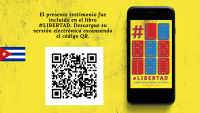Exile is my masterpiece
Download image
Luis Eligio Omni was born on July 10, 1972, in Havana, under birth name Eligio Pérez Meriño. His mother moved from the Sierra Maestra to the capital city in order to take part in The Cuban Literacy Campaign launched by the revolutionary regime of Fidel Castro. His father was a high-ranking military officer, who had left Louis, as well as his mother, and reunited with them later in adulthood. As a child, Louis lived in a small apartment of a former shopping centre in Neptuno located in Centro Habana district. He and his mother weren’t the only ones living there. They shared the flat with an aunt and many other family members. There were even times when that little space was lived in by up to 13 people. Due to the lack of money, the house was overall in very poor condition and the family was often starving. Luis then spent a substantial portion of his childhood in a students dormitory, experiencing a high level of violence among pupils. He was an inquisitive, sensitive child, enjoyed reading and writing yet often felt lonely. In elementary school danced breakdance and, from time to time, got himself into a brawl. Others considered him a problem child. But thanks to his mother, he did not have any major problems studying. She had been stealing pencils, papers etc. at work and then supplied the school director with the things currently in shortage. In high school, Luis studied civil engineering and by the late 1990s began meeting members of then two art groups - Omni and Zona Franca. Later it merged into one, called: Omni Zona Franca, which has become one of the most remarkable Cuban movements in the field of independent art, mingling various religions and artistic activities. Luis became one of the foreman members who organized workshops, furthermore supported all sorts of citizens’ art initiatives. Initially, the group was within the official regime institutions. However, the persecution by the authorities gradually escalated and peaked in 2009, when the group was excluded from the official regime’s cultural structures. Luis emigrated to the United States in 2013. To this day, he is very active in the sphere of human rights, promotes an independent art scene and freedom of thought. Together with his wife, they founded Omni-Kizzy Productions.
